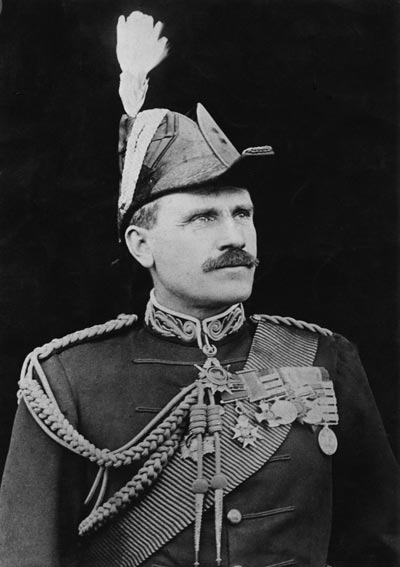Filmic structures are always tricky on stage. David Mamet, an exception, can get away with writing long chains of scenes that last a couple of minutes each. But the theatre prefers to relax, to snuggle down, to linger slowly over every morsel of a many-layered spread. Encountering a screenplay on stage is like receiving a box of Milk Tray in a restaurant and being told it’s a 32-course meal.
David Gooderson’s made-for-TV script concerns an Edwardian sex scandal featuring teenage boys and lauded grandees. Sir Hector MacDonald (aka Fighting Mac) was a crofter’s son who enlisted as an infantryman and reached the rank of major-general during a 20-year career. To rise so high without a private income was pretty rare in Britain’s gentry-loving military. Fighting Mac was posted to Ceylon (now Sri Lanka) to serve as General Officer Commanding and it’s here that we first meet him. And what a pest he is.
He’s a chippy, moralising disciplinarian, and his chief talent is for barking orders at nervous subalterns and refusing the offer of a wee drinkie on the verandah. As a Highlander, he secretly loathes the suave English colonists who laze around the hill stations of Ceylon playing cricket, pouring whiskies down their throats and holding fancy-dress parties as if they were all ensconced in cosy Woking. With no fighting for Fighting Mac to do, he must rely on his diplomatic skills. But he has none. Expected to waltz with the Governor’s wife at a ball, he shouts across the room, ‘It’s my duty to dance with you. So let’s move into position.’ ‘General,’ she says, ‘I’m not a gun carriage.’
Fighting Mac prefers the company of a lowly Ceylonese bank clerk whose teenage sons he lavishes with gifts. But danger lurks in these innocent connections. A plot is afoot to oust him from the colony. He’s accused of improper conduct with the boys. Busy tongues then claim that Fighting Mac exposed himself to some kids on a train. (In fact, he’d popped into the jungle for a slash while the line was being cleared after a rockfall.) To prevent a scandal, the Governor persuades him to take the first steamer back to England. But his flight is interpreted as guilt. From this moment, the play turns into a tragic thriller full of contemporary resonances. Fighting Mac was a celebrity in the Edwardian world. His stern, resolute features were distributed on cigarette cards and Empire tea caddies around the globe. When he was court-martialled, he became headline news overnight. And he knew that even if he beat the charges his reputation would never recover. The army abandoned him. Unable to reveal the secret that would clear his name, he blew his brains out in a Paris hotel. A photo of a handsome young boy was found in his wallet, and the true identity of this young lad comes as a profound shock.
David Gooderson has written a brilliant polemic against our cruel desire to prejudge sexual scandals. When a new case emerges, we succumb to ecstasies of disapproval rather than seeking out the plain old boring facts. There are some shortcomings in this production. The stage is too cramped for Gooderson’s ambitious, far-ranging script. The costumes, largely unironed, seem to have been borrowed from a homeless servicemen’s shelter. More props are needed, too. Golf clubs have to double as rifles in a parade-ground scene.
Not every performance is top-drawer either, but the silky-voiced Philip York is marvellously devious as a genial toff who knifes Fighting Mac between the shoulder blades. Elizabeth Counsell, all feathery hair and perfumed diction, gives a superb portrait of Edwardian hypocrisy as the Lady Governor. Stuart McGugan, playing the lead, grows convincingly from a truculent misfit into a bear-like tragic hero, and towards the end he reaches peaks of heart-tugging grandeur. Some bright young button at the BBC should scoot along to the Finborough and snap up this script. It’s already television. It could become great campaigning television.
At Hampstead, Maureen Lipman is still pootling on stage every night in Sarah Wooley’s curious comedy about ageing and responsibility. Lipman plays sad, dull, grey-haired Joyce, a put-upon bus-pass, who finds herself suddenly liberated by her husband’s death. Rather than dwindle into mourning, Joyce tells her family to shove it, buys herself a new red overcoat and hits the clubs. She befriends a young lap dancer at a strip joint and treats her to cream teas at the Ritz. This wildly improbable relationship is made believable, and rather touching, by Lipman’s utter niceness and by her quietly calculated humour. The play’s message is that our debt to our young expires as soon as they have young of their own. Great! But when a globetrotting gran busts her hip
doing the Cresta run, she’ll find the favour bank is bare. Enjoyable but a youngster’s fantasy.







Comments